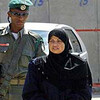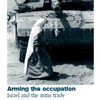
Israeli military appeal committee defers conclusion of second six-month review of transfer order
13 August 2003
On Sunday, 10 August 2003, an Israeli Military Appeal Committee convened in Erez to conduct the second six month review of an Israeli military order which transferred Intisar and Kifah ‘Ajouri from the West Bank to the Gaza Strip. After representations, the Committee deferred the conclusion until a later, unspecified, date. Read more about Israeli military appeal committee defers conclusion of second six-month review of transfer order



